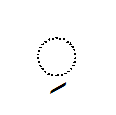

The Belarusian Arabic alphabet [a] or the Belarusian Arabica [b] [1] was based on the Perso-Arabic script and was developed in the 15th or 16th century. It consisted of 28 graphemes, including several additions to represent Belarusian phonemes not found in the Arabic language.
Contents
- Additional graphemes
- Equivalence chart
- Vowels
- Consonants
- Ligature
- Sample text
- See also
- Notes
- References
- Further reading
- External links
The Belarusian Arabic alphabet was used by the Lipka Tatars, who had been invited to settle in the eastern territories of the Grand Duchy of Lithuania—a region that now comprises modern-day Belarus. During the 14th–16th centuries they gradually stopped using their own language and started using the Ruthenian language (modern Belarusian and Ukrainian) rendered in the Belarusian Arabic alphabet. Books of that literary tradition are known in Belarusian as Kitab (Belarusian : Кітаб), which is Arabic for 'book' or 'written material'.

Some Polish texts were also written in the Arabic script in the 17th century or later. [2]




